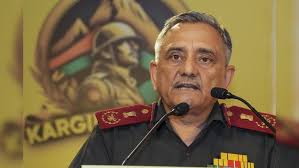NEW DELHI: Just days after the skirmish with Pakistan, Chief of Defence Staff General Anil Chauhan has penned his thoughts in a book on how to fight future wars and laid down a blueprint —theatre commanders, and not the service chiefs, will be responsible for operations and war fighting. He mentioned the need for “deliberation” and “diligent prognosis”.
The General has come out with a book titled “Ready, Relevant and Resurgent: A Blueprint for the Transformation of India’s Military”. Defence Minister Rajnath Singh released the book in New Delhi on Thursday. It offers insights into the ongoing transformation of the Indian armed forces to meet the demands of 21st century warfare.
Giving a firm opinion on the transformation and creation of “theatre commands”, which will integrate all manpower and equipment in a geographical area under one commander, the CDS states that the theatre commander will have the responsibility of force application (that is, to fight wars and conduct operations), whereas the chiefs of the armed forces will be responsible for what is colloquially called the “raise, train and sustain (RTS) function”. In other words, the service chiefs will not be responsible for fighting wars or conducting operations.
The CDS notes that the transformation will trigger new operational and administrative challenges. The acceptability of the change will only happen once officers at all levels are aware of the impending changes. An essential prerequisite for the establishment of theatre commands is a high degree of jointness among the three services and the physical integration of several processes, activities and essential infrastructure, writes the CDS.
The book articulates a vision for building a “future-ready” force. The CDS writes that the “future of warfare itself needs deliberation, diligent prognosis and an informed assimilation”. The armed forces need to build capabilities to conduct integrated multi-domain operations across the spectrum of conflict. He calls for organisational structures, capabilities and strategies to be dovetailed into our understanding of the future.
War and warfare are continuously evolving at a rapid pace, and the armed forces need to absorb new and emerging technologies as well as evolve new tactics to be future-ready, General Chauhan says in his book. It involves not only modernising equipment but also modernising doctrinal concepts, tactics, techniques and procedures.
Technology, he says, has a major influence on the conduct of combat. Military technology finds application in the civilian domain and vice versa.


